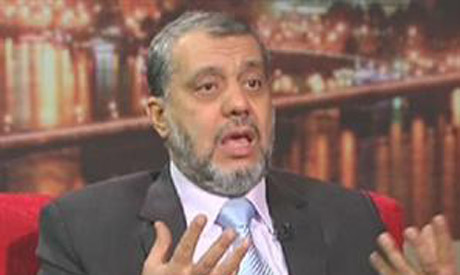
A member of the Muslim Brotherhood’s Shura Council, Ali Bateekh, specified criteria for a presidential candidate the group will support, while reiterating that the Brotherhood will not endorse one of its own members or any candidate belonging to an Islamist party or movement. However, Bateekh said the candidate “should have an Islamist orientation,” (although not a formal affiliation) and must have the ability to mediate between Islamist and liberal forces. He also noted that presidential powers will be reduced in the next political system.
ELECTIONS:
1) A member of the Muslim Brotherhood’s Shura Council, Ali Bateekh, specified criteria for a presidential candidate the group will support, while reiterating that the Brotherhood will not endorse one of its own members or any candidate belonging to an Islamist party or movement. However, Bateekh said the candidate “should have an Islamist orientation,” (although not a formal affiliation) and must have the ability to mediate between Islamist and liberal forces. He also noted that presidential powers will be reduced in the next political system. [al-Ahram, English, 3/6/2012]
2) Islamist presidential candidate Mohamed Selim al-Awa described Egypt’s decision to allow indicted NGO employees to travel as “a heinous crime.” He also said he does not trust the Presidential Election Commission to administer free and fair elections, over concerns that the committee’s chairman, Abdul Moaz Ibrahim, may have intervened in the judiciary’s investigation to help lift the travel ban. [al-Shorouk, Arabic, 3/6/2012]
SCAF:
3) Al-Ahram outlines four potential “safe-exit” scenarios for the SCAF:
- “The Turkish Option” – In this most likely scenario, according to Professor Essam Shiha, the SCAF would succeed in codifying special privileges and guarantees of “immunity” from parliamentary oversight in the new constitution
- Loyal President – The SCAF would back a military loyalist for the presidency and rally other political forces to elect their preferred candidate, which would allow the SCAF to wield political influence from behind the scenes.
- Coup d’Etat – In the least likely scenario, the SCAF “could induce generalized chaos” to create the pretext for a military coup, leading to a declaration of martial law, a ban on all political parties, and severe restrictions on civil liberties.
- SCAF Re–shuffle – In this variation on the third scenario, middle-ranking military officers could stage an internal coup within the SCAF, publicly criticizing the generals’ decisions and promoting themselves as an alternative, while quietly remaining loyal to the SCAF and guaranteeing them a safe exit, either directly or through mere “show trials.” [al-Ahram, English, 3/6/2012]
NGO INVESTIGATION:
4) Prime Minister Kamal Ganzouri said that Egypt “will not kneel” before foreign pressure and stressed that the investigation “belongs solely the judiciary, and no executive official may interfere with its work.” [al-Masry al-Youm, Arabic, 3/6/2012]
5) Justice Minister Adel Abdel Hamid promised an “extensive” investigation into whether the lifting of the travel ban imposed on foreign defendants in the NGO trial was the result of any inappropriate intervention. Both the Cabinet and the SCAF have denied any interference in the judiciary’s investigation. [al-Masry al-Youm, English, 3/6/2012]
6) Four American NGO employees indicted by the Egyptian government, including Sam LaHood, met with Senator John McCain, who recently traveled to Cairo to meet with members of the SCAF. [AP, English, 3/6/2012]
SECURITY/SINAI:
7) The Salafist Front staged a relatively small demonstration in front of the parliament building on March 5 to commemorate the anniversary of the "fall of State Security,” when protesters stormed the state security headquarters last year. Protesters demanded the release of Salafi sheikh Omar Abdel-Rahman – currently serving a life sentence in the US for his alleged role in the 1993 World Trade Center bombing – and also accused the SCAF of “caving to American pressure” in agreeing to lift the travel ban on American NGO employees. [Al-Ahram, English, 3/6/2012]
8) Unidentified vandals bombed the pipeline carrying gas to Israel and Jordan in the 13th such attack since Mubarak’s resignation. The pipeline had not been fully functioning since the last bombing on February 5. [al-Ahram, English, 3/6/2012]
Photo Credit: al-Ahram
Image: bateekh.jpg

